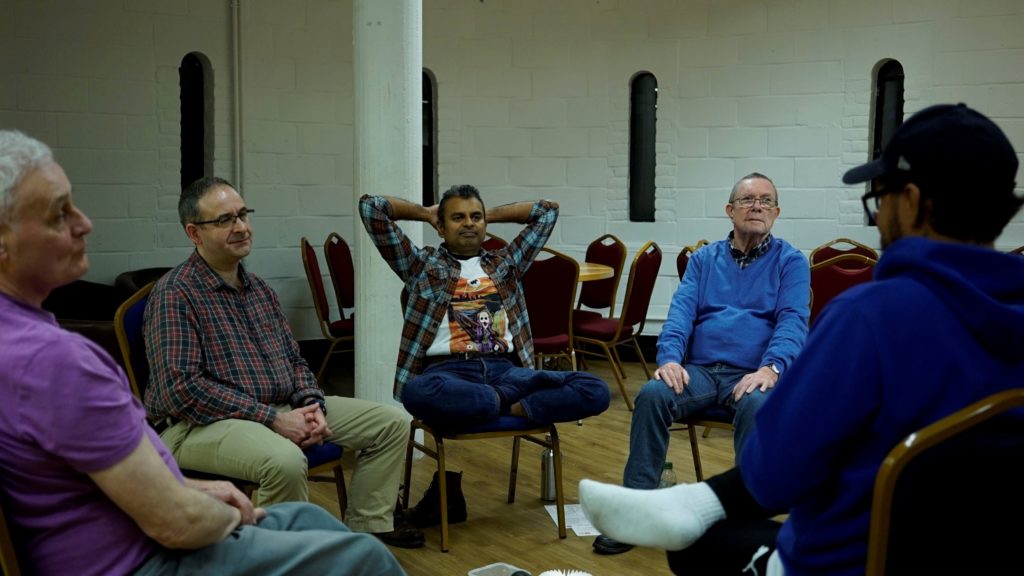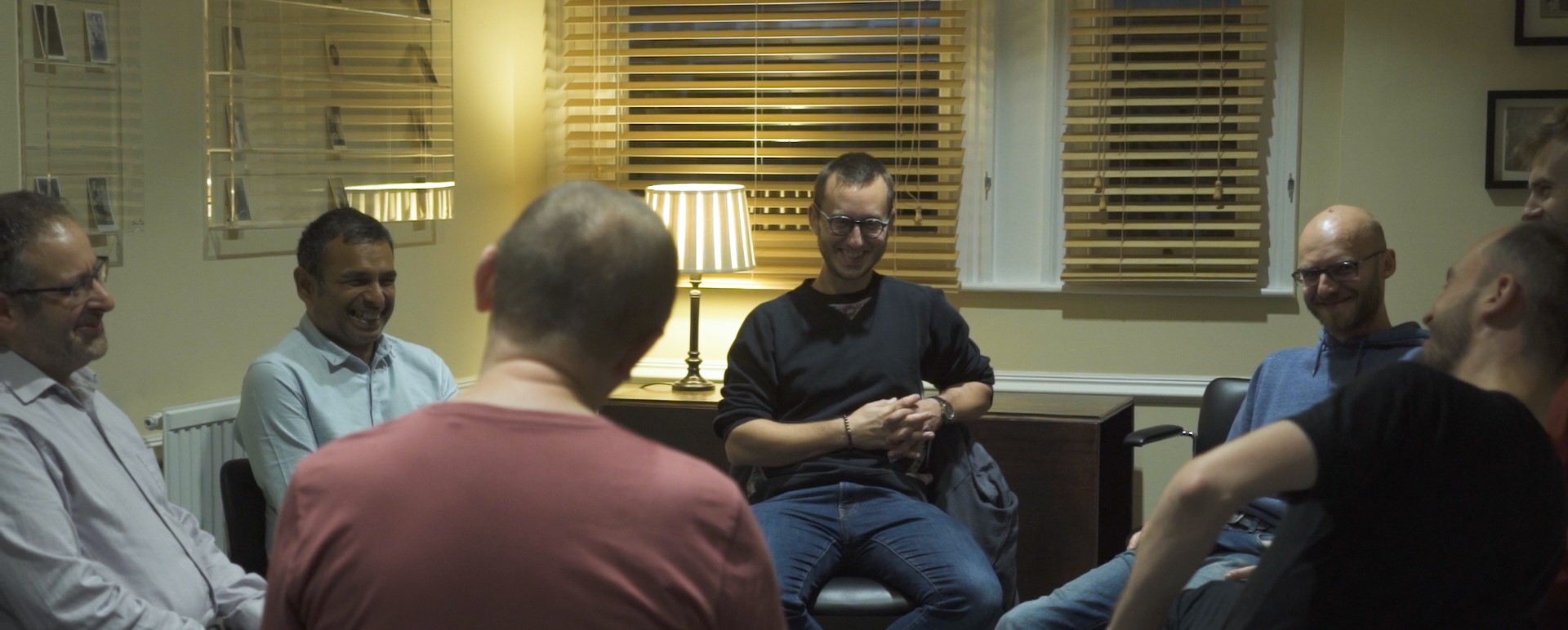Men’s groups are trying to reshape masculinity in a bid to improve happiness and mental health. Is toxic masculinity is taking lives?
Why is it so dark in here? It’s unsettling.
My arms and legs were crossed. Closed body posture: a sign that you’re uncomfortable. I shifted my weight around the chair trying to find a natural-looking position, which made me look more nervous.
I wasn’t anxious, but I was worried about seeming disinterested.
There were eight of us in the small, dark room in Camden. The door was locked, and we sat facing each other in a circle.
I started a conversation with the man opposite, but it was short-lived. Kenny announced we were about to begin.
First thing on the agenda was introducing ourselves, but not in a way you’d expect a group of men who’ve never met to introduce themselves.
A laminated card of questions circled the room with each man running through the list in turn.
When it came to me, I dutifully told the room about something that I loved, what made me angry, and of course when I’d last ejaculated. I’d forgotten to say when I’d last cried, but that wasn’t on the list. Apparently the list needed updating, but when it came to my turn I read awkwardly from what was in front of me.
I wouldn’t have been able to tell them anyway. It had been a while.
Perhaps that’s the point. I’m no tough guy, far from it, but I still don’t cry. Well, not often anyway.
Is that toxic masculinity? Am I unhappier because of it?
Toxic masculinity has been in the media a lot lately. It’s a hard term to nail down: used in various incarnations to describe different aspects of male behaviour that can be harmful. Over competitiveness, sexism, masking emotions and macho or homophobic behaviour often make the list, but there’s no hard and fast definition.
Men’s groups are a making changes to masculinity because harmful, as it turns out, also means harmful to men internally. So much so it might be contributing to the suicide rate.
The meeting in Camden was a men’s group called Men Speak, and it was founded by personal development consultant, Kenny Mammarella-D’Cruz. Men Speak make use of the tagline: man up… and talk about it!
Men Speak don’t make it their mission to tackle toxic masculinity, but they do aim to improve the well-being of men through better communication.
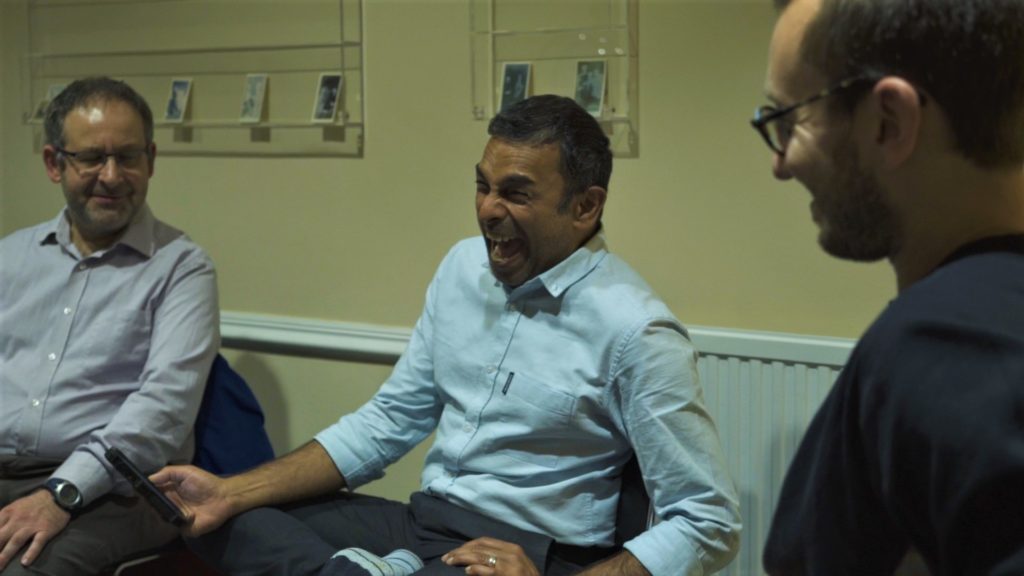
Andy’s Man Club is another group trying to get men talking, but they focus specifically on reducing the male suicide rate. It was started by Luke Ambler when his brother in law, Andy Roberts, tragically took his own life.
Andy’s Man Club project development worker, Andrew Greenway, provided some insight into how toxic masculinity can be harmful to men internally. “The way society teaches us to be is, a stiff upper lip and boys have to be big, strong, not showing their emotions on the exterior. I think those stigmas and social attitudes have contributed a lot to how guys feel, they feel as though it’s weak to speak.”
We may need charities like Andy’s Man Club more than we realise, because the statistics around male suicide are pretty shocking. Greenway summed it up in a sentence. “Male suicide being the biggest killer of men under 45,” he said, “One man every two hours taking their own life in this country alone.”
It is overwhelmingly a male issue, too. That is not to say that women don’t tragically take their own lives, but overall men seem to do it far more than women. Professor Jonathan Scourfield has conducted research into the sociological factors surrounding suicide, and he confirmed that this is the case. “Men are more at risk of suicide than women,” he said, “A factor of three or four times more likely so it’s a consistent finding.”
Whereas Greenway’s focus is on the UK, Professor Scourfield was able to add some global context to the issue. “It’s also not just a British thing,” he said, “It was the case that in pretty much every country in the world there was a gender disparity with men much more likely to kill themselves then women.” It’s true that there’s gender disparity in suicide rates, but is toxic masculinity truly to blame?
Greenway thinks it’s at least part of the problem. He’s optimistic about masculinity making progress in the right direction, but we might be doing this through changing toxic attitudes. “More and more people are challenging those attitudes around toxic masculinity,” he said. “The man up sort of culture.”
Greenway knows his stuff. He clearly cares deeply about the issue and has made it his business, literally, to know what he’s talking about. But not everyone shares the opinion that the elusive term, toxic masculinity, takes centre stage in male mental health issues.
Mammarella-D’Cruz takes a more critical view of the term. He’s reluctant to say that it’s exclusively masculine. “Toxic masculinity can be expressed by male, female, young, old. And the same with toxic femininity. But to put toxic and masculinity together is just a cheap attack.”
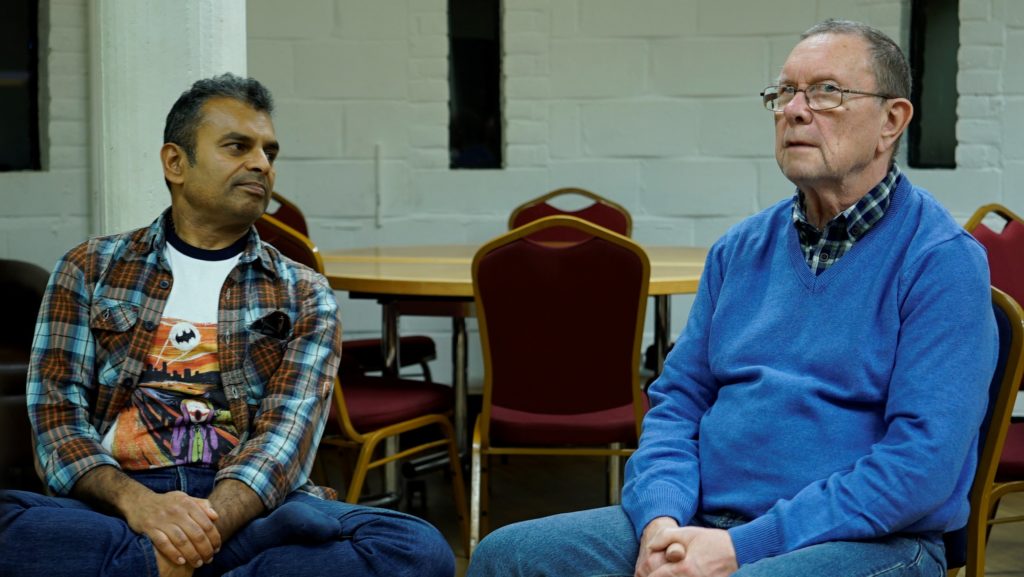
Where Andy’s Man Club and Men Speak meet, is in the idea that men need to talk more openly and honestly to improve their well-being. Speaking specifically about suicide, Professor Scourfield agrees. He was quick to point out that it can only be a good thing, but he’s also wary about the issue being oversimplified. “One of the problems in the way that the male suicide rate is sometimes discussed in the media,” he said, “Is that it is discussed within a very narrow frame, and one of the key things that keeps coming up is about how good men are at talking. Now, I don’t deny that that is an issue, it is an issue, but it’s absolutely not the only issue.”
Toxic masculinity isn’t totally about men’s inability to talk about their feelings. Professor Scourfield shed some light on other areas we may not consider in relation to male suicide. “There’s not a lot about the reasons why people feel suicidal in the first place which is very, very gendered I think,” he said.
Professor Scourfield went on to explain how some men may have unhealthy attitudes to relationships, and this can be a contributing factor. “We came across cases in our study of suicides that seemed to be triggered by extreme jealousy of an ex-partner being with someone else,” he said. “It was a very small number, but quite vivid stories of really extreme control.”
There is a link here between male suicide, and another aspect of highly detrimental male behaviour. “Some of the attitudes, which are perhaps more common than we think towards relationships,” Professor Scourfield said, “Are all linked in with domestic violence, all part of a continuum of controlling behaviour, are implicated in some suicides.”
He was quick to clarify that this is not an explanation of the high male suicide rate by any means, but it is a contributing factor, and an example of how the issue is more complex than is sometimes portrayed. “That’s an example of something that doesn’t often get said,” he continued, “Instead there tends to be this rather narrow focus on problems of men not being very good at talking about issues.”
It depends on the content of those conversations, and this might be where Men Speak comes in. Neil Hacket has been attending Men Speak since 2011, and recently he’s trained as a group facilitator. He said men’s approach to relationships often comes up in the groups. “A big thing that has come up in the groups for many men, is the idea of enmeshed relationships. An enmeshed relationship is where you blame someone else for how you’re feeling, or you feel responsible for someone else’s feelings.”

Hacket, Mammarella-D’Cruz and the guys at Men Speak advise a different approach to relationships. Hacket says being assertive is part of solving this problem, which is something we might usually view as being part of the toxic masculinity toolkit. “When the guy feels his role is to serve the woman’s needs and not really to voice his own, and to voice his own would be toxic masculinity. Actually, it’s completely counterproductive because there’s nothing for the woman to meet.”
It seems moving away from traditional, negative, perhaps toxic masculinity requires that something takes its place. It must be a proactive response, not a just passive one. Hacket explained that doing what you think others want all the time is not a viable solution. “Another thing we talk about is nice guy syndrome, where a guy is just nice all the time actually may be furious inside, but for various reasons feels in order to survive his strategy needs to be always be nice to other people. So, that’s another toxic masculinity in the sense that in the long run it can make other people very uncomfortable and distant, no one can get close to a nice guy.”
Reshaping masculinity might take more than doting the ‘I’s and crossing the ‘T’s with a super up to date PC lexicon and a lot of ‘I feel’ statements. During our session at Men Speak a dispute erupted, albeit in a controlled way with constructive dialogue. It seemed to centre around one man’s way of constantly steering the conversation towards him, while he tried to assert his knowledge on whatever area or topic we were discussing. Whereas the man in question used all the terminology of an archetypal progressive new man, by trying to dominate the group his behaviour could be called toxic masculine.
It seems to some degree we can’t get away from who we are. Another group member was instantly likable: energetic, friendly and seemed as though he had a genuine interest in helping others with their problems. His charisma would place him at the alpha side of the male scale. His natural behaviour interfered with his good intentions though, as he couldn’t help talking over people or hijacking conversation threads.
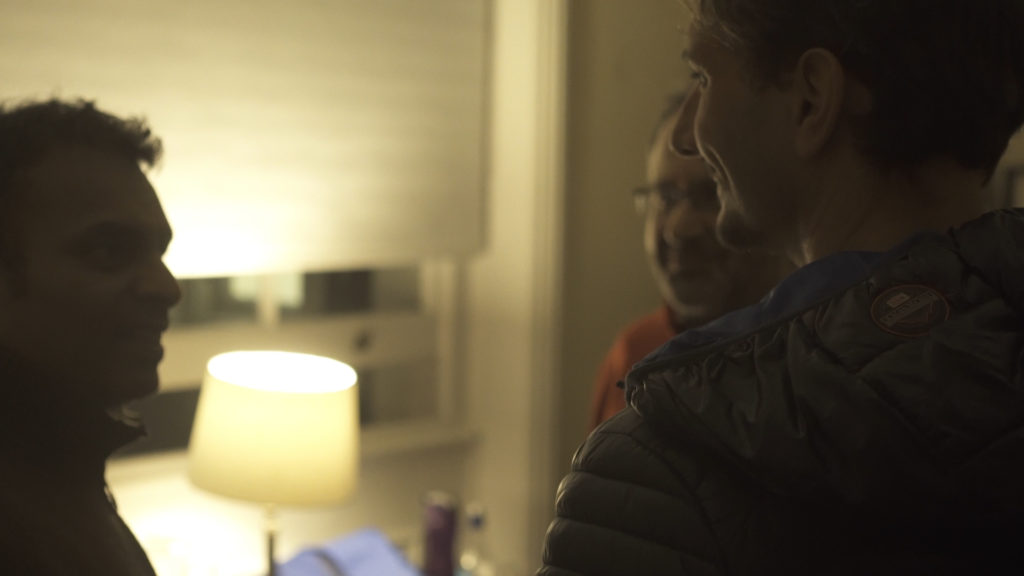
Whether we can counteract our programming is a complicated question. But even the more grounded problem of the male suicide rate can be equally hard to understand. On the complexity of the issue, Professor Scourfield drew attention to the fact that not all men are equally at risk of suicide. “It’s not all men, of all backgrounds or all ages equally at risk,” he said, “There’s a higher risk in middle-aged, working class men.”
Middle-aged men don’t make the headlines so much, because by the time we reach that age other causes of premature death start to catch up with us, so suicide stands out as a leading cause of death in young men. However, in terms of absolute numbers of people taking their own lives, it’s actually higher amongst older men.
There are theories as to why men towards retirement age may find themselves in a dark place. Toxic masculinity conditions men to be highly competitive: they must be successful above all else. But this might not make us happy, and it catches up with men at middle-age.
Professor Scourfield explained this with an example from Tom Joiner, a psychologist and suicide expert whose father took his own life. “Joiner’s dad was a high achieving, well-paid businessman, and went through his life focused on very traditional masculine ideas about occupational success and earning money. He had a family, but then when he got divorced from his wife and he was on his own, he couldn’t cope because he didn’t really have friends. He didn’t have anything else to support him.” This success above all mentality could be called toxic masculinity, and focusing too much on work without nurturing good relationships can have consequences when it all crashes down.
There might be a simpler explanation as to why older men may struggle more than the younger: attitudes change over generations. Andy’s Man Club has been successful in reaching men across generational lines, but Greenway highlighted that older men could face more difficulties. “We have guys in that room who are late middle-age, who will have gone through the age of being told not to talk, you don’t show emotion, you don’t embrace your feelings.”
It’s not all men, of all backgrounds or all ages equally at risk. There’s a higher risk in middle-aged, working class men.”
Professor Scourfield
Generational differences are just one part of the puzzle, but it there may be a gendered aspect to high the rate of suicide amongst working-class men too. Professor Scourfield theorised as to why that might be the case. “The world of work is very much changing, and perhaps older men grew up expecting more traditional masculine jobs. Working-class men expecting traditional masculine jobs which involved making things, and actually those jobs aren’t there anymore.” However, the Professor was quick to point out that this is unproven territory. “There’s plausible ideas in there,” he said, “But it’s all a very untested, there’s no clear evidence.”
Whether the changing nature of the job market is impacting on suicide rates amongst working-class men or not, it certainly seems possible that the guys doing the manliest jobs might not do so well when it comes to opening up about their feelings.
At least that might have been the case, but Greenway thinks things are changing. He pointed out that the club’s founder comes from a professional background that we might not associate with being emotionally open. “Luke’s a former professional rugby league player,” he said, “That’s an atmosphere with an awful lot of toxic masculinity still. They’ll spend 80 minutes pretending not to be hurt. For somebody to be coming from that sort of background to be saying to us it’s OK to talk, it’s not weak to speak, I think it’s a massive message.”
Their campaigns have been endorsed by world-renowned boxer, Anthony Joshua, as well as other prominent fighters. Greenway explained that it can be a powerful message when people who might be viewed as tough guys open up about mental health. “Ten years ago the boxing club, even now the boxing club is an intimidating place to be. If guys in there say to you, you can come in here to talk it’s only going to be encouraging. And if there’s guys in there saying, even if you don’t feel comfortable to talk in here, why don’t you go and have a look at that place that opens on Monday night seven o’clock? Andy’s Man Club give it a look.”
There are passionate people working towards to improving male mental health, as well as welcome celebrity endorsements from genuine supporters. But some, it seems, have jumped on the bandwagon. New masculinity weekends are available through two other companies for the low, low price of £400 to £600, with the higher priced option providing luxury gym floor accommodation.

People will always cash in on the trend of the time, but that doesn’t mean everyone is. Andy’s Man Club is a charity with volunteer facilitators, and Greenway was emphatic about the difference opening up can make. “What we’re talking about here isn’t just a fad, it’s not just of the now, if you like. This needs to happen.”
Men bottling up their emotions is key toxic masculine trait and it seems to be contributing to men taking their own lives, but the problem is too multifaceted to solve so easily. Professor Scourfield used an example of two different at-risk groups to highlight this complexity. “Some studies suggest that there’s elevated risk of suicidal thinking amongst gay and bisexual men, compared to heterosexuals. You’ve also got men who are kind of in trouble with the law, offenders, are also at elevated risk. Now, you’ve got very different models of masculinity there.”
Some might say these elevated risk groups are affected by toxic masculine culture. The tough guys can’t live up to the hyper-masculine ideal, and the toxic masculine attitudes in society make life more difficult for gay and bisexual men. But perhaps it’s best to take the Professor’s advice and not speculate. “I think often the way that it’s discussed in the press,” he said, “Is as if there are one or two key issues which explain it all. It’s just more complicated than that.”
Towards the end of my time at a men’s group I grew impatient with the endless ‘I feel’ statements, but then I’m lucky enough to have people in my life that I can talk openly with. For those that don’t, it might be the only chance they get to really open up. And whether toxic masculinity is truly to blame for the high suicide rate among men or not, talking about mental health problems is surely the first stage in addressing it.
Professor Scourfield agrees. “I think the issue of how well men cope with mental health is increasingly talked about,” he said, “And that’s all really encouraging stuff I think.”
